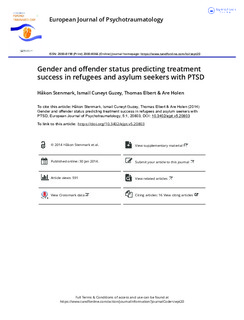| dc.contributor.author | Stenmark, Håkon Inge | |
| dc.contributor.author | Guzey, Ismail Cuneyt | |
| dc.contributor.author | Elbert, Thomas | |
| dc.contributor.author | Holen, Are | |
| dc.date.accessioned | 2019-11-06T06:55:26Z | |
| dc.date.available | 2019-11-06T06:55:26Z | |
| dc.date.created | 2014-12-10T08:44:42Z | |
| dc.date.issued | 2014 | |
| dc.identifier.citation | European Journal of Psychotraumatology. 2014, 5 (1) | nb_NO |
| dc.identifier.issn | 2000-8066 | |
| dc.identifier.uri | http://hdl.handle.net/11250/2626762 | |
| dc.description.abstract | Background
Current knowledge is limited regarding patient characteristics related to treatment outcome of posttraumatic stress disorders (PTSD) in refugees and asylum seekers.
Objective
Gender, torture status, offender status, level of anger, and level of depression were investigated for possible effects on the treatment outcome.
Method
Patient characteristics were explored in 54 refugees and asylum seekers who had completed a treatment program for PTSD. Non-responders (10), those who had the same or higher levels of symptom severity after treatment, were compared with responders, those who had lower symptom severity after treatment (44). Symptom severity was measured by Clinician-Administered PTSD Scale. The non-responders and responders constituted the dichotomous, dependent variable. The independent variables were gender, torture status, offender status, level of anger, and level of depression. T-tests and Exact Unconditional Homogeneity/Independence Tests for 2X2 Tables were used to study the relationship to treatment outcome.
Results
Being male and reporting to have been a violent offender were significantly more frequent characteristics among the non-responders compared to the responders. The levels of pretreatment anger, depression and torture status did not affect the treatment outcome.
Conclusions
The study adds support to findings that females benefit more from treatment of PTSD than males and that violent offenders are difficult to treat within the standard treatment programs. | nb_NO |
| dc.language.iso | eng | nb_NO |
| dc.publisher | Taylor & Francis | nb_NO |
| dc.rights | Navngivelse 4.0 Internasjonal | * |
| dc.rights.uri | http://creativecommons.org/licenses/by/4.0/deed.no | * |
| dc.title | Gender and offender status predicting treatment success in refugees and asylum seekers with PTSD | nb_NO |
| dc.type | Journal article | nb_NO |
| dc.type | Peer reviewed | nb_NO |
| dc.description.version | publishedVersion | nb_NO |
| dc.source.volume | 5 | nb_NO |
| dc.source.journal | European Journal of Psychotraumatology | nb_NO |
| dc.source.issue | 1 | nb_NO |
| dc.identifier.doi | 10.3402/ejpt.v5.20803 | |
| dc.identifier.cristin | 1183165 | |
| dc.description.localcode | © 2014 Håkon Stenmark et al. This is an open-access article distributed under the terms of the Creative Commons Attribution 4.0 Unported (CC-BY 4.0) License (http://creativecommons.org/licenses/by/4.0/), allowing third parties to copy and redistribute the material in any medium or format, and to remix, transform, and build upon the material, for any purpose, even commercially, under the condition that appropriate credit is given, that a link to the license is provided, and that you indicate if changes were made. You may do so in any reasonable manner, but not in any way that suggests the licensor endorses you or your use. | nb_NO |
| cristin.unitcode | 194,65,35,0 | |
| cristin.unitcode | 1920,17,0,0 | |
| cristin.unitcode | 1920,28,0,0 | |
| cristin.unitname | Institutt for psykisk helse | |
| cristin.unitname | PH - Avdeling for forskning og utvikling | |
| cristin.unitname | Klinikk for anestesi og intensivmedisin | |
| cristin.ispublished | true | |
| cristin.fulltext | original | |
| cristin.qualitycode | 1 | |

